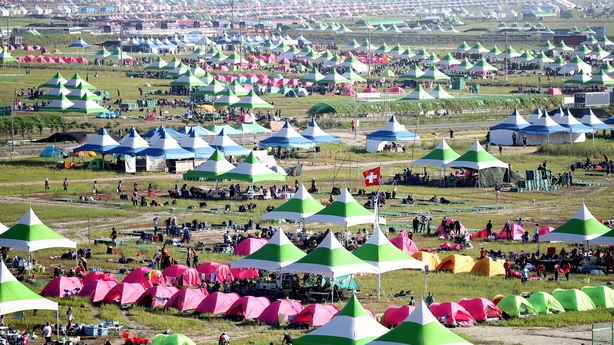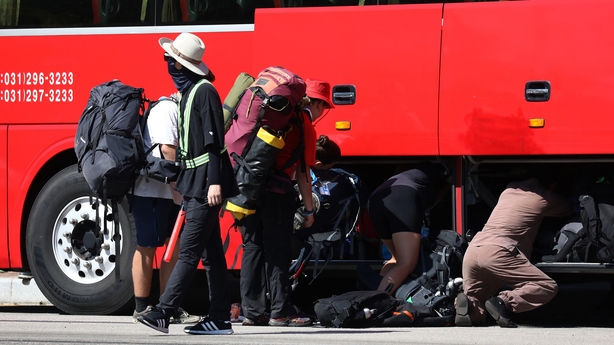Tens of thousands of scouts are being evacuated from their problem-plagued South Korean campsite ahead of a typhoon, as the scout chief said the challenges were unprecedented in a century of global jamborees.
"This is the first time in more than 100 years of World Scout Jamborees that we have had to face such compounded challenges," said Ahmad Alhendawi, Secretary-General of the World Organization of the Scout Movement.
He said the massive event, which brought together about 43,000 scouts to a campsite in South Korea's North Jeolla province, had been "very unlucky with the unprecedented heatwave and now the typhoon".
Scouting Ireland said 144 Irish scouts under the age of 18, along with 78 adults, were in South Korea for the jamboree, but they are now leaving the event.
In a statement, it said: "The Irish contingent were among the first to leave the site and are relocating to Woosuk University in Jeonju, which is out of the path of the coming tropical storm.
"The Irish scouts have begun arriving at the university where they will be in staying dormitory accommodation.
"26 members of the Irish group including the Contingent Management Team and 18 adult volunteers working at the Jamboree will remain until the last scouts have been moved off site.
"It is expected that this group will leave in the coming hours for Woosuk University and will arrive well in advance of the impending storm.
"The entire Jamboree is expected to reconvene on the 11th of August in a closed/roofed stadium for a K-pop concert and closing ceremony, which will be attended by the Irish contingent."

Read more:
Heatwave, overflowing toilets at South Korea's 'cursed' scout jamboree
Scouting Ireland says scouts relieved jamboree moved to Seoul
Small number of Irish scouts among 600 treated for heat at Korean jamboree
The adverse weather conditions had "significantly impacted the planning and delivery of the 25th World Scout Jamboree" Mr Alhendawi said, adding that despite the challenges, scouts had shown "true resilience, determination and leadership in the face of adversity".
The scout body said that it was the first time a campsite had been evacuated due to inclement weather since 1971, when a typhoon struck during a world scout jamboree in Japan.
At the sprawling campsite in Buan today, tens of thousands of scouts were packing up their tents and belongings and queuing up to get onto buses bound for alternative accommodation in Seoul and the surrounding areas.
Korea Special Forces were on hand to help with the evacuation. The government had said it would send 1,000 buses to move the mostly teenage scouts from the site.
'A really great time'
Korean media have called the jamboree "a national disgrace" after an extreme heatwave caused hundreds of scouts to fall ill and prompted American and British scout groups to withdraw.
The scout chief acknowledged some shortfalls at the site, saying in a post on LinkedIn that they had a "bumpy start with ... services and facilities".
But scouts at the campsite told AFP they were sad to leave.
"It's really hard but we had a great time. It took some while to get used to the circumstances but the youth they had a really great time," said Nicola Raunig, 27, Austria scout unit leader.
"I'm sad it will end now," she said, adding that she had hoped participants could have enjoyed "the whole experience".
"But we will make the best out of it," Ms Raunig said.

Typhoon Khanun, which killed at least two people in Japan, is due to make landfall in South Korea on Thursday, near where the scouts were camping for their problem-plagued jamboree.
Organisers had insisted the event would continue despite the challenges, but on Monday they confirmed the scouts would be evacuated and the campsite closed due to the approaching typhoon.
South Korea's weather agency said Typhoon Khanun is forecast to bring heavy rain and strong winds across the Korean peninsula.
Organisers have been strongly criticised by Korean media and parents of the scouts for a lack of planning for the extreme heat, even though South Korea had six years to prepare.
Media also reported on poor drainage at the site, rudimentary showers and toilets, and gruesome bug bites affecting the participants.

